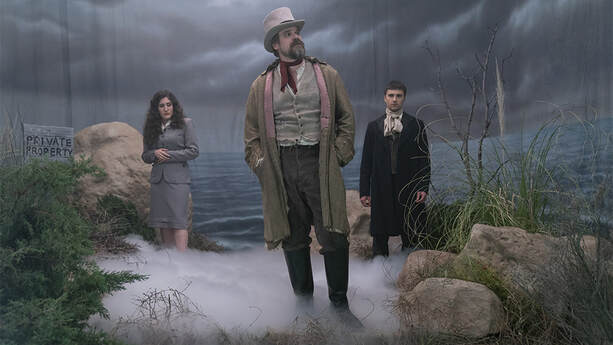 By now, many of you know who David Harbour is. Perhaps best known for his role as Hopper in Stranger Things, It’s no wonder that Netflix would continue to work with the charming star, but whatever they’re smoking, I want some, because Frankenstein’s Monster’s Monster, Frankenstein, is a whole different monster than anyone could have expected… …I don’t know if Frankenstein’s Monster’s Monster, Frankenstein (or FMMF as I’ll call it), is meant to be a tease for a potential feature, a favor that Harbour owed someone, or just something dumb and fun that Harbour and friends wanted to do, but whatever it is, we should all be glad it exists. Directed by Daniel Gray Longino (Portlandia) and written by John Levenstein (Arrested Development), FMMF follows Harbour playing himself as he attempts to learn more about his famous actor of a father (also played by Harbour), and the infamous, live, made for TV play based off of Mary Shelley’s Frankenstein that he did so many years ago. I’ll say this right away: if you were planning on pulling out the ole pitch fork and torches, put them away, because FMMF will go down as one of Harbour’s best performances…or at least, his funniest. Harbour immediately sucks you right into the humorous premise like a bearded vacuum, as FMMF kicks off with Harbour walking down a long line of portraits of the Harbour men, all of them looking exactly like David. In playing a somewhat brainless version of himself, this is Harbour unlike you’ve ever seen him, and he’s never been funnier. Portraying both himself and his fictional actor father (his real father supposedly works in real estate), this is a far cry from the endearing though gruff drunk we’re used to from Stranger Things. Both versions of Harbour come off as dimwitted, with his father revealed as a pretentious asshole who constantly clashes with the other actors in the play for being “unprofessional”, even though he is the worst of them all, which is a joy to watch. The entire cast in FMMF is simply hilarious. Featuring Kate Berlant, O-Lan Jones, Heather Lawless, Michael Lerner, Alfred Molina, Mary Woronov and so many more, whether in the play or as friends and co-workers that knew David’s father, FMMF is overflowing with fun performances that are an absolute pleasure. Being a commentary on live daytime dramas like Dark Shadows, everyone is acting their asses off by pretending to not be very good at all. Actors stare at the camera. They forget lines, or improvise with dialogue that has no place on the stage. Anyone who’s ever watched shows like Dark Shadows know that this is exactly the sort of stuff that would happen, and the actors/actresses capture that “bad acting” quality beautifully in as entertaining of a manner as possible. FMMF perfectly captures that aesthetic of daytime television, all the way down to the look of the film, which is presented as a VHS recording of the play from decades ago, with some old commercials of Harbour’s “father” spliced in for extra fun. The film genuinely feels like it was dug out of an old trunk somewhere, with hazy edges of the frame and the occasional ripple of static through the image. FMMF revels in the poor quality of that time. Watching FMMF will have you feeling like you’re wrapped in a warm blanket of cheesy nostalgia, going back in time to watch one of the worst things to hit daytime television, and it’s a journey you’ll love to take. Running at about thirty minutes, you’ll probably ask yourself repeatedly, as I did, what crazy person greenlit this, and how do I thank them? I honestly can’t think of why life would be given to such a monstrosity of a strange, random Netflix special, but I’m glad some mad scientist filmmakers created this monster. FMMF is so alive with good humor and nonsensical insanity that there were plenty of times where I found myself wondering what the hell was happening, but it really doesn’t matter, because this is the sort of film that hides its flaws by making you laugh so hard, you can’t see through the happy tears pouring out of your eyes. At a certain point, I couldn’t even remember what question Harbour was trying to ask with this faux film, or if that was even ever clear at all, but by the end, all that matters is that FMMF is a damn good time without having to always make sense. Of course, the ludicrous nature of FMMF isn’t going to work for everyone, and I get it. The central plot is weak to essentially non-existent. There’s really no point to any of what feels like the experiment of a madman. FMMF is all about the fake play and the humor revolving around that. Harbour’s narrative in trying to uncover some “family secret” with this is so purposely pointless, that a lot of you will probably be scratching your heads after the last reel with a look of confused amusement. All in all, FMMF isn’t going to be for everyone, but this film is loads of fun, and one hell of a delicious, greasy snack for fans to eat up and clog our arteries with. FMMF may be too short, but it’s perfect for when you need a quick jolt of laughter. I’m not sure Mary Shelley would be proud to see what’s been done with her work here, but, like most of us, I’m sure she wouldn’t be able to help but smile at Harbour’s exceptional performance. With this, Netflix has proven they have no fear in dealing with the underground oddities of the film world. And if this is a tease of sorts, I can only hope that the filmmakers behind FMMF are stitching together something truly incredible as a continuation. FMMF is now alive on Netflix. By Matt Konopka
1 Comment
7/23/2019 02:46:06 am
One day someone will produce the documentary "The death of Netflix: too big to fail" Reason #1 going for quantity, not quality
Reply
Leave a Reply. |
Archives
March 2023
|


 RSS Feed
RSS Feed